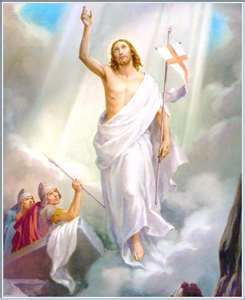YOUR EMPTY TOMB [ MATTHEW 28:1-10] – EASTER SUNDAY, 20 APRIL 2014
EASTER is the celebration of what Pope Paul VI described as “the unique and sensational event on which the whole of human history turns.”
Scripture has no account of the actual happening of the resurrection of Jesus. We are told of the discovery of the empty tomb and of the appearance of the risen Lord to various disciples. By means of these appearances the disciples are led into making the huge step of faith from following the man, Jesus of Nazareth, to believing that He was the Son of God who triumphed over death.
It was as if somebody who could walk suddenly found the ability to fly. Resurrection life is as much (and more) above ordinary, earthly life as flying is above walking. Faith is such a leap forward from the human level of life to participation in divine life. (Fr. Silvester O’Flynn OFMCap.)
The tomb is empty: Jesus Christ is risen: and the story of humanity will never be the same again.
There is a very puzzling line in the old translation of the Apostles’ Creed” “He descended into hell.” It is a phrase that locates Jesus on that Sabbath between the dying and the rising.
The word “hell” in this instance is not a reference to the state of eternal damnation. The originally meant a hiding place. Later it acquired a more precise application to the hidden abode of the dead. The phrase in the creed expresses the belief that Jesus liberated the souls of the just who had died before His time.
In an apocalyptic reflection on the death of Jesus, Matthew’s Gospel states: “The rocks were split; the tombs opened and the bodies of many holy men rose from the dead, and these, after His resurrection, came out of the tombs, entered the Holy City and appeared to a number of people” (Matthew 27:52-53).
The notion of Jesus opening up he hiding places of the dead is relevant to all the caves of darkness where we hid in pain from the fullness of light. In His dying He destroyed our death: by His wounds He heals our wounds: by His lying in the tomb He has visited all our private tombs.
We descend into the tomb of darkness whenever the reality of life is too painful for us to endure. The quality of our living is diminished, we are emotionally crippled and mentally stagnated.
Is your cave of darkness due to the pain of bereavement? Then reflect on the fullness of life released for us by the victory of Jesus. And remember how He experienced the pain of family farewell as His mother’s heart was pierced by the sword of sorrow.
Is your dark cave is due to experiences of misunderstanding, misrepresentation, or malicious conspiracy, just remember that Jesus was in there before you. He was the victim of religious envy, a political pawn and He was betrayed by one who had shared the covenant meal with Him.
His suffering was a physical nature in the hundred inventions of cruelty unleashed upon Him: He suffered intense mental anguish: and He even visited the dark realm of spiritual suffering.
He was condemned in court to hang with convicted criminals, mocked in ungrateful tribute to His works of healing, and stripped bare of the very garments of human dignity. Is there any form of private hell He did not visit?
Whatever your tomb, your hiding place, your private hell, come out of it this Easter day. In the light and power of the risen Christ, leave behind you an empty tomb.
Prayer: Dear Lord Jesus, what a beautiful life you have given me! Let me sing of the glorious hope that comes from your resurrection. And, by the power of Your resurrection, I have left behind my empty tomb. With each day – but especially today – make my joy a gift to you, a grateful acknowledgement of the love You have for me. Amen.
Note: Taken [except for the prayer] from Fr. Silvester O’Flynn OFMCap., The Good News of Matthew’s Year, Dublin, Ireland: Cathedral Books/The Columbia Press, 1989 (1992 reprinting), pages 81-84.


